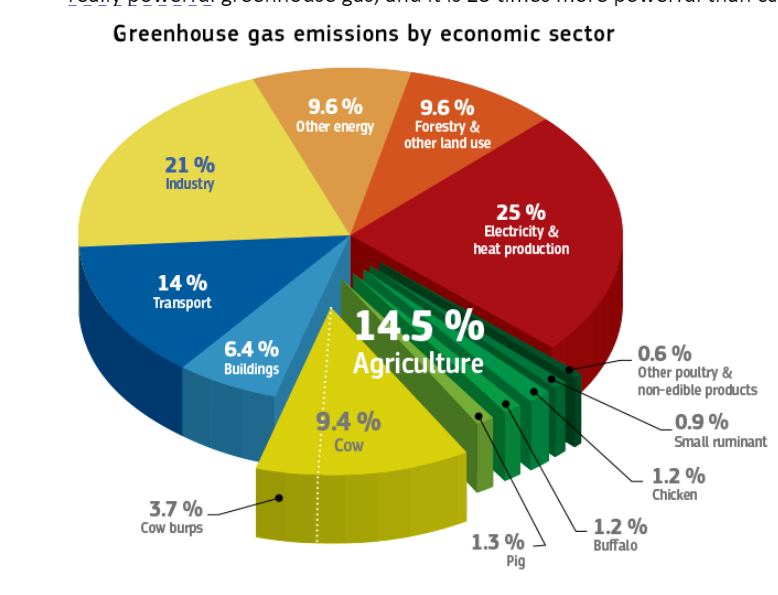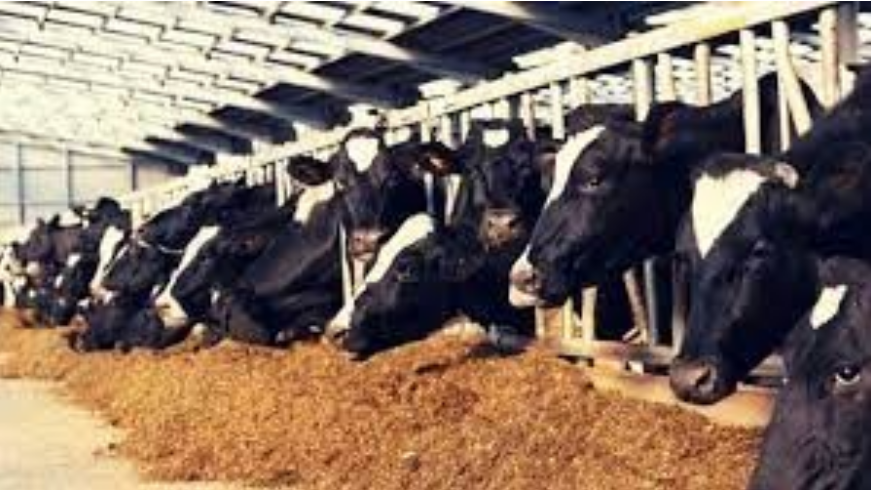Alternative diets; can the reduction of meat in our diets change the planet?
- Carolina Torres
- Jan 10, 2022
- 6 min read
Meat. A really tasteful food for you but is it really that tasteful for the world? There are many things that we don’t think about before stuffing our face with the beef we have right in front of us; however, as you devour that meal, the world is slowly falling apart. Cows have a strong effect on our atmosphere, their burps are harmful to it and if cows had their own country, they’d be the third biggest greenhouse emitter in the world. Cows are ruminant; meaning that in their stomachs their have microbes which helps them digest by fermenting their food. Having this process, through their burp’s methane is released. Methane is a really powerful greenhouse gas, and it is 23 times more powerful than carbon dioxide.


Cows are responsible for 62% of the agricultural emission and livestock farming takes 18% of the human produced greenhouse gases. Half of it is from cows (Kaplan). To add one, cows’ manure,
after it has been added to fertilizer produces phosphorus and nitrogen which if it rains, it runs of into your local waterways such as rivers and lakes. This contributes to algal bloom, which is what makes the water green, this produces toxins which are potentially harmful for drinking water (“Reducing the Environmental Impact of Cows’ Waste”).
Solutions are difficult, especially because about 86% of the population of the earth eat meat (Buchholz). One solution that is already spreading quickly around the globe is being plant based. A plant-based diet is a diet based on plants with a few or no ingredients derived from animals (BDA). There are many different plant-based diets such as a vegan diet, pescatarian diets, vegetarian diet and much more. A vegan diet is a diet that does not consume any type of animal derived products. A pescatarian diet is a diet that does not eat any meat however does consume fish. Nevertheless, have chosen to focus on a vegetarian diet. According to the dictionary, a vegetarian diet or vegetarianism is the practice of not eating meat or fish especially for moral, religious, or health reasons.
A misconception about vegetarianism is that people don’t have diverse options of food and

meals because of this restriction of not being allowed to eat meat. Yet, there are various components that are seen in a vegetarian meal. One of the most spotted constituents are legumes such as beans, lentils and peas, whole grains, soy products, nuts and nut containing products, dairy and eggs. To add on, there are various different nutrient in these foods, which are necessary for your day to day life. Legumes include plant protein, fibre, vitamins, minerals such as iron, calcium, potassium and more. Legumes have many nutrients similar to meat nonetheless it has lower iron levels and no saturated fats (“Healthy Food Trends –
Beans and Legumes: MedlinePlus Medical Encyclopedia”). Whole grains, such as brown rice, oatmeal and pasta have protein, fibre, vitamins, carbohydrates and trace minerals such as iron, zinc, copper and magnesium (Zelman). Soy products include vitamin B, fibre, potassium, magnesium and high quality protein (“Straight Talk about Soy”) while nuts have protein, fats, carbohydrates, fibre, vitamin E, magnesium and phosphorus (Ruairi Robertson, PhD). Dairy products include calcium, phosphorus, vitamin A, Vitamin D, Vitamin B12, protein and many more! (“Dairy | MyPlate”) Finally eggs contain protein, fats, irons, vitamins, minerals and to add on, eggs are a disease fighting nutrient power house meaning that they have nutrients such as lutein, zeaxanthin and more which are great for fighting illnesses! (Zelman)
Consuming a plant-based diet such as a vegetarian diet will drastically lower the amount of methane released into the air. In 2021, 1 billion cows reside on earth due to cattle farming. To compare, from last year to this year there has been an increase of 13.2 million cows in the world (“World Cattle Inventory by Country”). If we stop eating a drastic amount of meat, less cows will be produced to feed us meaning that there would be a lower amount of gas emitted to our atmosphere. Different studies have also shown that if we stop consuming meat, each person will reduce 20 to 30% of the greenhouse gases they release (Marsh).
Not only by being vegetarian will decrease the amount of methane released into the atmosphere, it will also reduce climate change, disforestation and others. People don’t take into account the amount negative impact the factories of the food industry have on the world. They take a huge amount of space, they create deforestation and release gases so that the slaughter machines can work. 80% of the deforestation today is caused by cattle ranching (“Unsustainable Cattle Ranching”) and it farming livestock releases 6 billion tons of greenhouse gases to the atmosphere each year (“Air Pollution as a Result of Intensive Farming - FAIRR”). A lot of water is wasted with the livestock farming industry because factories still need to provide food and water for the animals so that they have the desired meat. Surprisingly this industry uses 20 to 33% of all fresh water consumptions the world (“Animal Agriculture Wastes One-Third of Drinkable Water (and 8 Other Facts for World Water Day) - Mercy for Animals”).
Oxford University has shown evidence that suggests meat eaters are responsible for two times the amount of gas released into the atmosphere than people with plant based diets. Additionally, if people stopped consuming meat there could be a 73% reduction of your carbon footprint. (“Going Vegan Can Help Reduce Greenhouse-Gas Emissions”) With this and more statistical evidence, it is clear that by reducing or stop consuming meat
there would have a huge impact on the world of today. Researchers have shown that being plant based lowers the rate of having heart diseases, type 2 diabetes, and some types of cancers when comparing to someone with a high meat consumption (Shmerling). It also lowers blood sugar, decreases asthma symptoms and promotes bone health, all that we need to live a long happy life (Marcin). If we look back, becoming vegetarian will in all increase your body health and make essentials parts of you healthy and strong. Practising a vegetarian diet will be good for the environment and you will also waste less money on grocery shopping!
Even though there are these positive factors, vegetarianism is not all positives and there are a few risks. There are not many cons seen in vegetarianism that can be life effecting however most people are concerned about the lack of meat nutrients that vegetarians don’t consume. It is proven that even though vegetarians are less likely to have heart problems, they are more likely to get a stroke (Doheny). People who eat plant based diets also often suffer from anemia due to the low levels of iron which makes them fatigued and increases your heartbeat. Unfortunately, being a vegetarian might worsen your mental health. An experiment was placed in 2012 comparing mental health of meat eaters and vegetarians. 31% of the vegetarians suffered from a criteria of anxiety disorder while only 13% of the meat eaters were diagnosed with anxiety. A similar test was ran but measuring depression and results were similar. This was most likely caused by nutrient deprivation such as vitamin B12, iron and others (Schreiber). People also struggle with not being able to adapt to the new lifestyle because many love the taste of meat. Changing such a big part of your life and what you eat can be hard, but it is harder to change your mindset which leads to a smaller amount of people wanting to become vegetarians.
Citations
Vergunst, Francis, and Julian Savulescu. “Five Ways the Meat on Your Plate Is Killing the Planet.” The Conversation, 26 Apr. 2017, theconversation.com/five-ways-the-meat-on-your-plate-is-killing-the-planet-76128. Accessed 12 Nov. 2021. — (Vergunst and Savulescu)
Kaplan, Sarah. “Are My Hamburgers Hurting the Planet?” Washington Post, The Washington Post, 18 Nov. 2019, www.washingtonpost.com/climate-solutions/2019/11/18/are-my-hamburgers-hurting-planet/. Accessed 15 Nov. 2021.
“Reducing the Environmental Impact of Cows’ Waste.” Osu.edu, 2017, cfaes.osu.edu/news/articles/reducing-the-environmental-impact-cows-waste. Accessed 15 Nov. 2021.
“Can We Make Cow Burps Climate-Friendly?” Europa.eu, 2015, ec.europa.eu/research-and-innovation/en/horizon-magazine/can-we-make-cow-burps-climate-friendly. Accessed 19 Nov. 2021.
Buchholz, Katharina. “Infographic: Eating Meat Is the Norm Almost Everywhere.” Statista Infographics, Statista, 20 May 2021, www.statista.com/chart/24899/meat-consumption-by-country/#:~:text=On%20average%2C%2086%20percent%20of,almost%20everywhere%20in%20the%20world.. Accessed 22 Nov. 2021.
BDA. “Vegetarian, Vegan and Plant-Based Diet.” Uk.com, 2021, www.bda.uk.com/resource/vegetarian-vegan-plant-based-diet.html#:~:text=A%20plant%2Dbased%20diet%20is,for%20a%20variety%20of%20reasons.. Accessed 19 Nov. 2021.
Shmerling, Robert H. “Plant-Based Diets Are Best… or Are They? - Harvard Health.” Harvard Health, Harvard Health, 31 Oct. 2019, www.health.harvard.edu/blog/plant-based-diets-are-best-or-are-they-2019103118122. Accessed 19 Nov. 2021.
“Healthy Food Trends - Beans and Legumes: MedlinePlus Medical Encyclopedia.” Medlineplus.gov, 2013, medlineplus.gov/ency/patientinstructions/000726.htm. Accessed 22 Nov. 2021.
Zelman, Kathleen M. “Tips for Reaping the Benefits of Whole Grains.” WebMD, WebMD, Apr. 2005, www.webmd.com/food-recipes/features/reap-the-benefits-of-whole-grains#:~:text=Whole%20grains%20are%20packed%20with,and%20some%20forms%20of%20cancer.. Accessed 22 Nov. 2021.
“Straight Talk about Soy.” The Nutrition Source, 6 Aug. 2018, www.hsph.harvard.edu/nutritionsource/soy/. Accessed 22 Nov. 2021.
Ruairi Robertson, PhD. “The Top 9 Nuts to Eat for Better Health.” Healthline, Healthline Media, 17 Nov. 2021, www.healthline.com/nutrition/9-healthy-nuts. Accessed 22 Nov. 2021.
“Dairy | MyPlate.” Myplate.gov, 2020, www.myplate.gov/eat-healthy/dairy#:~:text=D%2C%20and%20protein.-,Nutrients,choline%2C%20magnesium%2C%20and%20selenium.. Accessed 22 Nov. 2021.
Zelman, Kathleen M. “Good Eggs: For Nutrition, They’re Hard to Beat.” WebMD, WebMD, 26 June 2007, www.webmd.com/diet/features/good-eggs-for-nutrition-theyre-hard-to-beat#1. Accessed 22 Nov. 2021.
Marsh, Sarah. “Going Vegan: Can Switching to a Plant-Based Diet Really Save the Planet?” The Guardian, The Guardian, 25 Apr. 2021, www.theguardian.com/lifeandstyle/2021/apr/25/going-vegan-can-switching-to-a-plant-based-diet-really-save-the-planet#:~:text=The%20literature%20on%20the%20impact,30%25%20for%20halving%20meat%20consumption. Accessed 22 Nov. 2021.
“Going Vegan Can Help Reduce Greenhouse-Gas Emissions.” Downtoearth.org.in, 2014, www.downtoearth.org.in/blog/going-vegan-can-help-reduce-greenhousegas-emissions-49341. Accessed 22 Nov. 2021.
Doheny, Kathleen. “Are There Health Downsides to Vegetarian Diets?” WebMD, WebMD, 4 Nov. 2019, www.webmd.com/diet/obesity/news/20191104/are-there-health-downsides-to-vegetarian-diets#:~:text=Downsides%20to%20Eating%20Vegetarian%2FVegan,of%20stroke%20than%20meat%20eaters.. Accessed 22 Nov. 2021.
“Unsustainable Cattle Ranching.” Panda.org, 2020, wwf.panda.org/discover/knowledge_hub/where_we_work/amazon/amazon_threats/unsustainable_cattle_ranching/#:~:text=Extensive%20cattle%20ranching%20is%20the,current%20deforestation%20(Nepstad%20et%20al.. Accessed 22 Nov. 2021.
“Air Pollution as a Result of Intensive Farming - FAIRR.” FAIRR, FAIRR, 9 Nov. 2020, www.fairr.org/article/air-pollution-as-a-result-of-intensive-farming/. Accessed 22 Nov. 2021.
“Animal Agriculture Wastes One-Third of Drinkable Water (and 8 Other Facts for World Water Day) - Mercy for Animals.” Mercy for Animals, 21 Mar. 2018, mercyforanimals.org/blog/animal-agriculture-wastes-one-third-of-drinkable/. Accessed 22 Nov. 2021.
Schreiber, Katherine. “6 Ways Being a Vegetarian Could Seriously Mess You Up.” Cosmopolitan, Cosmopolitan, 2 Mar. 2016, www.cosmopolitan.com/health-fitness/a54533/is-being-a-vegetarian-bad-for-your-brain/. Accessed 22 Nov. 2021.





Comments